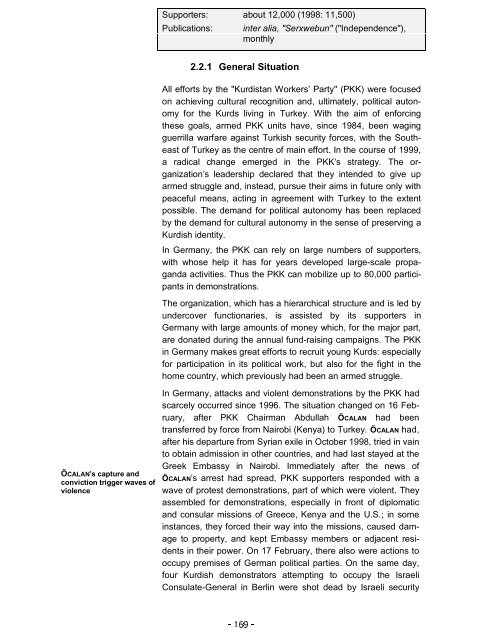Left-Extremist Endeavours
Left-Extremist Endeavours
Left-Extremist Endeavours
You also want an ePaper? Increase the reach of your titles
YUMPU automatically turns print PDFs into web optimized ePapers that Google loves.
ÖCALAN’s capture and<br />
conviction trigger waves of<br />
violence<br />
Supporters: about 12,000 (1998: 11,500)<br />
Publications: inter alia, "Serxwebun" ("Independence"),<br />
monthly<br />
2.2.1 General Situation<br />
All efforts by the "Kurdistan Workers’ Party" (PKK) were focused<br />
on achieving cultural recognition and, ultimately, political autonomy<br />
for the Kurds living in Turkey. With the aim of enforcing<br />
these goals, armed PKK units have, since 1984, been waging<br />
guerrilla warfare against Turkish security forces, with the Southeast<br />
of Turkey as the centre of main effort. In the course of 1999,<br />
a radical change emerged in the PKK’s strategy. The organization’s<br />
leadership declared that they intended to give up<br />
armed struggle and, instead, pursue their aims in future only with<br />
peaceful means, acting in agreement with Turkey to the extent<br />
possible. The demand for political autonomy has been replaced<br />
by the demand for cultural autonomy in the sense of preserving a<br />
Kurdish identity.<br />
In Germany, the PKK can rely on large numbers of supporters,<br />
with whose help it has for years developed large-scale propaganda<br />
activities. Thus the PKK can mobilize up to 80,000 participants<br />
in demonstrations.<br />
The organization, which has a hierarchical structure and is led by<br />
undercover functionaries, is assisted by its supporters in<br />
Germany with large amounts of money which, for the major part,<br />
are donated during the annual fund-raising campaigns. The PKK<br />
in Germany makes great efforts to recruit young Kurds: especially<br />
for participation in its political work, but also for the fight in the<br />
home country, which previously had been an armed struggle.<br />
In Germany, attacks and violent demonstrations by the PKK had<br />
scarcely occurred since 1996. The situation changed on 16 February,<br />
after PKK Chairman Abdullah ÖCALAN had been<br />
transferred by force from Nairobi (Kenya) to Turkey. ÖCALAN had,<br />
after his departure from Syrian exile in October 1998, tried in vain<br />
to obtain admission in other countries, and had last stayed at the<br />
Greek Embassy in Nairobi. Immediately after the news of<br />
ÖCALAN’s arrest had spread, PKK supporters responded with a<br />
wave of protest demonstrations, part of which were violent. They<br />
assembled for demonstrations, especially in front of diplomatic<br />
and consular missions of Greece, Kenya and the U.S.; in some<br />
instances, they forced their way into the missions, caused damage<br />
to property, and kept Embassy members or adjacent residents<br />
in their power. On 17 February, there also were actions to<br />
occupy premises of German political parties. On the same day,<br />
four Kurdish demonstrators attempting to occupy the Israeli<br />
Consulate-General in Berlin were shot dead by Israeli security<br />
�����















